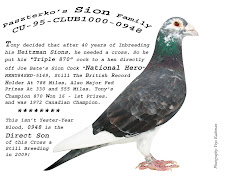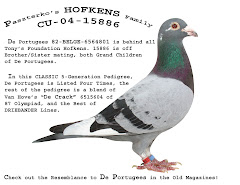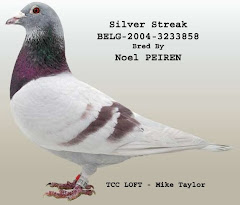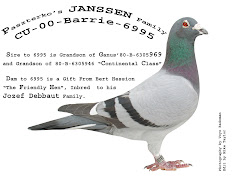It's always lonely being a teenager, but it's even more wretched when you're a teenage pigeon fancier. Just ask 16-year-old Stephanie Langley, secretary of the Young Fanciers Pigeon Club of Great Britain. Though more than 100,000 people in the UK share her hobby, most live off pensions rather than pocket money, and with just seven members left, the future of the YFPC is in the balance.
But the A-level student isn't going to let the 21-year-old club die without a fight. On the weekend she had travelled with her mum to Blackpool from her home near Liverpool to go on the offensive, 25,000 fanciers were expected at the Winter Gardens for the 36th annual British Homing World Show of the Year, and she was pulling out all the stops to persuade anyone aged seven to 17 to join her coop.
She had revamped the club's website, printed jazzy fliers and posters advertising her internet forum, Fancy Pigeons 4U, and was looking terribly official in a white lab coat with her name embroidered on the back. Helping her on the recruitment drive were two-sevenths of the club, Geordie sisters Rebecca and Samantha Meikle, 15 and 10.
"I think a lot of young people think all pigeons are like the pigeons you see on the streets - you know, flying rats spreading disease," said Rebecca, who won a trophy for "best juvenile fancier" on Saturday. "But they're not. I've got 18 and they're all really sweet and they are fun and cute, just like any other pet."
The Royal Pigeon Racing Association could do with more Meikles: the organisation haemorrhages 1,500 members a year, according to general manager Peter Bryant, who organised the two-day symposium. In other words, huge numbers of fanciers are dying off. "It's very difficult to get youngsters into the sport. It's a very much full-time commitment looking after birds, and when you've got Sony PlayStations it's difficult to try to get kids to focus on just one thing," he lamented. Looking slightly mournful manning a stall was 17-year-old Brindley Axe, from near Scunthorpe, whose grandfather Ian Axe is a famous "master breeder". But even direct connections to a pigeon breeding titan isn't enough to hook in this young chap. "I did have a loft but I got fed up of mucking it out and all that," he said.
Given the near-deserted ladies' loos at the Winter Gardens, it was clear that it is not just the young who aren't into pigeons, but women as well. "It's a shame there are so few women, but isn't it nice not having to queue for once?" said one older lady, who was accompanying her husband to the event.
Recruitment isn't the only problem plaguing the pigeon community: the arrival of bird flu in Britain has been painful too. After the outbreak in November on the Norfolk-Suffolk border, the Department for Environment, Food and Rural Affairs slapped a national ban on bird gatherings. No sooner was that lifted than H5N1 was discovered in three wild swans in Dorset this month. For a while it looked as though Defra could ban all pigeons from the show, which Bryant admitted would have been "a bit of a blow".
But the show went ahead, and there was plenty for pigeon fanciers to spend their money on, from probiotic feed to posh mahogany lofts, plus enough pigeons to send Ken Livingstone into apoplexy. The best were being auctioned off in the opera house. Last year one cock of particularly superb stock reached £14,000. On Saturday the top bird was a mealy pied hen called Goddess, which reached £1,900.
The only kind of pigeon you couldn't buy at Blackpool was a cooked one, though top fancy pigeon breeder Hayden Bogle said he did once receive an offer from the former Two Fat Ladies chef Clarissa Dixon Wright to supply her with pigeons for a friend's restaurant. "But I couldn't do it," he said. "I could never eat a pigeon: they're my friends."
Just fancy that
A DVD stall at the Winter Gardens was doing a brisk trade in documentaries about pigeons in Flemish. Belgium is regarded as the world centre of racing, with an estimated 60,000 pigeon fanciers in a nation of 10 million people. Modern pigeon racing originated there in the mid-19th century. Britain caught on in 1886 when King Leopold II gave the royal family some breeding stock. The Queen still keeps lofts at Sandringham.
Read more ...














